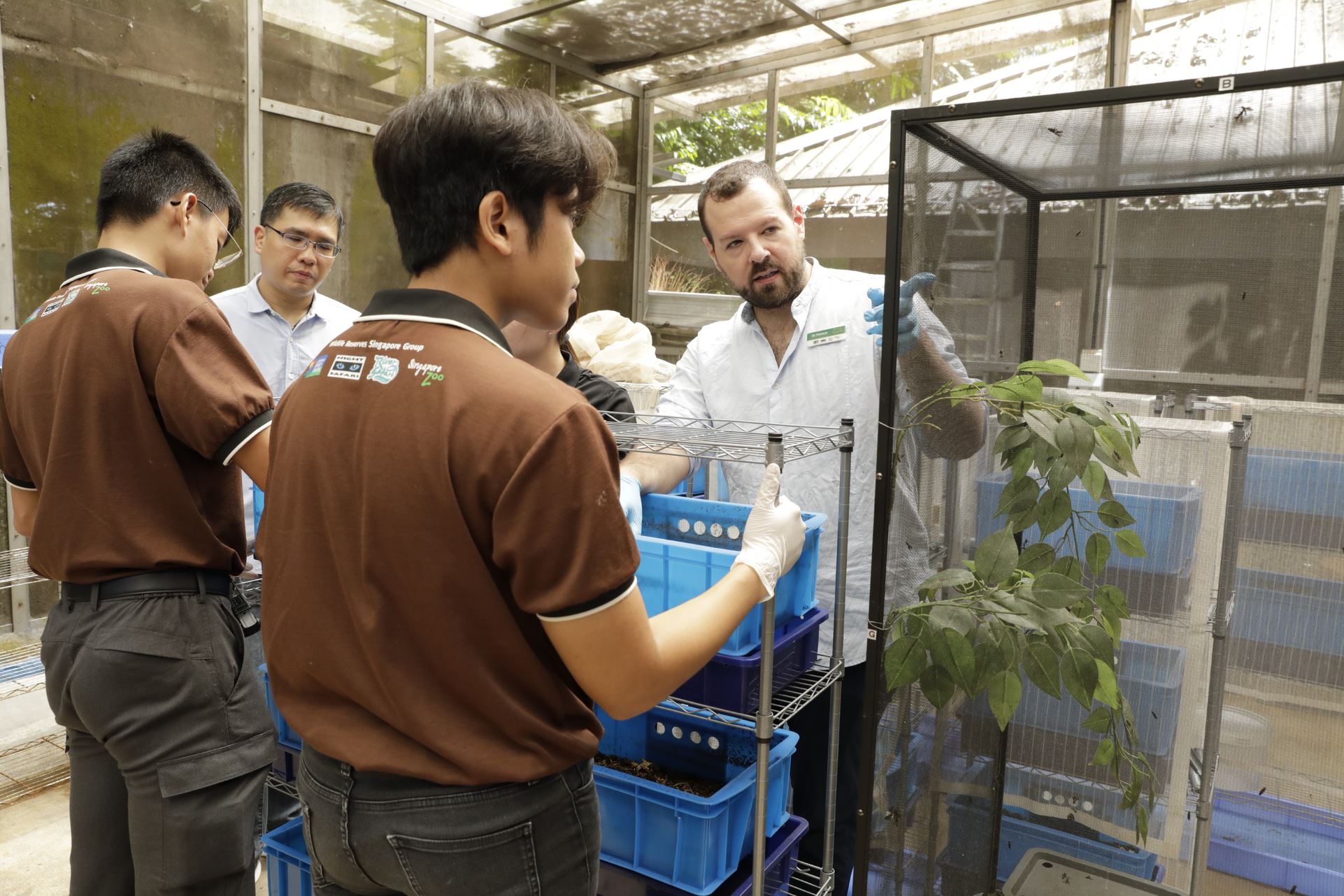The Pawfect Diet: Francis Cabana’s Pet Nutrition Journey
Join DANN TAN as he discovers the nutritional revolution shaping the health and happiness of our furry friends with Dr Francis Cabana.
BY
Dann Tan
Social Media Manager
Hype Issue #57
Published on
September 11, 2023
Ever wondered how your pet’s diet impacts their health and happiness?
As an owner of two dogs, I’ve always been intrigued by the intricate relationship between nutrition and the well-being of our furry companions. Nonetheless, the profound impact of what our pets eat has on their overall health and longevity didn’t hit me until I spoke with Dr Francis Cabana, a distinguished wildlife nutritionist.

Dr. Francis Cabana posing next to Champagne, a Jack Russell Terrier that overcame cancer thanks to a natural and fresh dietary plan. Photo Courtesy of PetCubes.
Dr Cabana’s journey into the world of animal nutrition is as unique as it is inspiring. Hailing from Montreal, he embarked on a path that eventually led him to the lush landscapes of Asia, where he began exploring the intricacies of animal nutrition in diverse ecosystems. His distinctive philosophy revolves around advocating for natural, non-mass-produced pet foods while rejecting highly processed snacks. Why? Because he’s seen firsthand the wonders of this approach while working with wild animals in West Java, Indonesia.

Dr. Francis Cabana engaged in the transformation of animal diets at Wildlife Reserves Singapore. Photo Courtesy of mothership.com.
During our conversation, Dr Cabana illuminated the critical role nutrition plays in our pets’ lives. He emphasised that nutrition isn’t just about sustenance; it’s about modifying genes, influencing longevity, and even reducing the risk of diseases like cancer.
“Nutrition is the single most important thing that you can focus on for your dog’s long-term health,” he asserted.
One of the stories that truly touched me was of his time working with zoo animals. He highlighted a stark contrast between European and American feeding practices for zoo animals. In Europe, a natural, whole-food approach prevails, while in the U.S., some zoos feed highly processed kibble to their animals. The difference in diets has, according to Dr Cabana, resulted in distinct health and lifespan variations among the animals. European Zoo animals experience fewer health problems and longer lifespans, highlighting the impact of consuming fresh, whole foods.

Dr Francis Cabana with a container of pumpkin seeds, rich in zinc, which benefits the immune system of orangutans. Photo Courtesy of mothership.com.
Dr Cabana’s expertise extends beyond theory, as he has personally witnessed the transformative power of proper nutrition. He shared a heartwarming success story about Sam, a senior Labradoodle with kidney and pancreas problems. By formulating a specific diet plan, Dr Cabana and his team managed to stabilise Sam’s health and significantly improve his quality of life. Witnessing such transformations sustains Dr Cabana’s mission and affirms his commitment to animal nutrition.
Finding the right equilibrium between convenience, cost-effectiveness, and excellence presents a formidable task within the pet food sector. Dr. Cabana offered insights into PetCubes’ strategy, a specialised pet food company that utilises only whole foods and fresh ingredients. He emphasised their commitment to providing premium, fresh pet food, acknowledging that cheaper alternatives often sacrifice ingredient quality or increase carbohydrate content. PetCubes aims to offer a middle-ground solution and encourages pet owners to incorporate fresh food into their pets’ diets, even if it means mixing it with kibble.

Dr. Francis Cabana working with Action for Singapore Dogs, a non-profit organisation committed to enhancing the well-being of dogs. Photo Courtesy of Dr Francis Cabana.
Dr Cabana envisions a future where veterinarians and nutritionists work collaboratively, bridging the gap between traditional veterinary care and alternative diets. He hopes for a common ground where pets’ health and well-being take precedence over biases and preconceptions.
As for wildlife nutrition, Dr Cabana’s aspiration is simple: more dedicated wildlife nutritionists. Amid the ongoing and growing concern for the preservation of our planet’s diverse ecosystems, he believes that every zoo should have dedicated nutritionists to ensure the proper care and nutrition of captive animals.

Dr. Francis Cabana enjoys a delightful day at the local park with Happy, the golden retriever. Photo Courtesy of Dr Francis Cabana.
Ultimately, Dr Cabana’s insights into the world of pet nutrition are not only informative but deeply moving, making us reflect on the profound impact we have on our pets’ lives.

Ambalaj SepetimMikrodalga yemek kapları,Sızdırmaz kaplar,Çorba kase ve kapaklar,Suşhi yemek kabı,Şamua kese kağıdı ,Yağlı kese kağıdı ,Dürüm kese kağıdı ,Kagit çantalar,Hamburger kutuları ,Fast food kutuları,Pipetler,Peçete ve mendiller,Gıda eldiveni,Doypack kilitli posetler
Kes – Mak Bahçe Aksesuarları ve Yedek Parça | Malatya kesmak, kes-mak malatya, malatya kes-mak, motorlu testere yedek parça,Malatya Stihl Bayi, benzinli testere yedek parça, testere zinciri, ağaç kesme pala, klavuz, elektronik bobin, hava filtresi, stihl malatya bayi, stihlmalatya,malatyastihl, stihl servisi, malatya stihl servis, malatya testere,malatyastihlbayi, stihl malatya, malatya stihl, stihl bayisi malatya, Hekimhan stihl bayi, malatya testere bayisi, malatya stihl servis, stihl malatya servis,
Lenipa Toptan Cep Aksesuarı telefon aksesuarları,telefon aksesuar toptan,telefon aksesuarlari toptan,toptan telefon aksesuar,toptan telefon aksesuarlari,cep tel,cep telefon,cep telefonu,en ucuz telefon,iphone 13 kılıf,iphone 13 pro kılıf,iphone 13 pro kılıfları,iphone 13 pro max kılıfları,iphone 13 pro max kılıfı,iphone kılıfları,telefon aksesuarları,telefon kılıfları,ucuz telefon,en ucuz akıllı telefon,en ucuz cep tel,en ucuz cep telefonu,en ucuz iphone 13,iphone 13 aksesuar,iphone 13 telefon kılıfları,iphone 13 şarj aleti,telefon ekran koruyucu,telefonlar ucuz,toptan telefon kılıf,ucuz akıllı telefon,ucuz cep tel,ucuz cep telefonu,ucuz telefon modelleri,şarj kılıfları,13 pro kılıfları,13 pro max en ucuz,akıllı cep telefonu en ucuz,akıllı telefon en ucuz,akıllı telefon kılıf,akıllı telefon ucuz,cep aksesuar,cep iletişim,cep tel en ucuz,cep tel kulaklık,cep telefon aksesuar,cep telefon ekran koruyucu,cep telefon ucuz,cep telefonu aksesuar toptan,cep telefonu aksesuarları,en ucuz 13 pro max,en ucuz akıllı cep telefonları,en ucuz iphone 13 pro,en ucuz iphone 13 pro max,en ucuz iphone telefon,en ucuz telefon modeli,en ucuz telefonlar iphone
bahçe makineleri, motorlu testere, motorlu tırpan, çim biçme makinası, budama makası, akülü testere, benzinli testere, ms 170, ms 250,bahçe el aletleri satışını yapan firmamız kredi kartına taksit fırsatları ile şimdi sizlerle.
Malatya Karaca Ticaret | NURKAN KARACA Malatya stihl bayi,Malatya stihl servis,Hızar motoru,Motorlu testere,Motorlu tırpan, Çim biçme makinası,Malatya karacalar,Malatya stihl, nurkan karaca Malatya’nın en köklü Stihl bayilerinden olan Nazım Karaca ve torunu Nurkan Karaca şimdi e-ticaret platformlarında faaliyet yürütmektedir. Mağazamız, hem stihl satışı hem de stihl servisliğini yapmaktadır.
Sitenizin tasarımı da içerikleriniz de harika, özellikle içerikleri adım adım görsellerle desteklemeniz çok başarılı emeğinize sağlık.
bahçe makineleri, motorlu testere, motorlu tırpan, çim biçme makinası, budama makası, akülü testere, benzinli testere, ms 170, ms 250,bahçe el aletleri satışını yapan firmamız kredi kartına taksit fırsatları ile şimdi sizlerle.
Malatya Karacalar Ticaret | Fatih KARACA Malatya Stihl Bayi, stihl malatya bayi, stihlmalatya,malatyastihl, stihl servisi, malatya stihl servis, malatya testere,malatyastihlbayi, stihl malatya, malatya stihl, stihl bayisi malatya, Hekimhan stihl bayi, malatya testere bayisi, malatya stihl servis, stihl malatya servis, Malatya’nın en köklü Stihl bayilerinden olan Fatih Karaca Ticaret mağazamız, hem stihl satışı hem de stihl servisliğini yapmaktadır.
Lenipa Toptan Cep Aksesuarı telefon aksesuarları,telefon aksesuar toptan,telefon aksesuarlari toptan,toptan telefon aksesuar,toptan telefon aksesuarlari,cep tel,cep telefon,cep telefonu,en ucuz telefon,iphone 13 kılıf,iphone 13 pro kılıf,iphone 13 pro kılıfları,iphone 13 pro max kılıfları,iphone 13 pro max kılıfı,iphone kılıfları,telefon aksesuarları,telefon kılıfları,ucuz telefon,en ucuz akıllı telefon,en ucuz cep tel,en ucuz cep telefonu,en ucuz iphone 13,iphone 13 aksesuar,iphone 13 telefon kılıfları,iphone 13 şarj aleti,telefon ekran koruyucu,telefonlar ucuz,toptan telefon kılıf,ucuz akıllı telefon,ucuz cep tel,ucuz cep telefonu,ucuz telefon modelleri,şarj kılıfları,13 pro kılıfları,13 pro max en ucuz,akıllı cep telefonu en ucuz,akıllı telefon en ucuz,akıllı telefon kılıf,akıllı telefon ucuz,cep aksesuar,cep iletişim,cep tel en ucuz,cep tel kulaklık,cep telefon aksesuar,cep telefon ekran koruyucu,cep telefon ucuz,cep telefonu aksesuar toptan,cep telefonu aksesuarları,en ucuz 13 pro max,en ucuz akıllı cep telefonları,en ucuz iphone 13 pro,en ucuz iphone 13 pro max,en ucuz iphone telefon,en ucuz telefon modeli,en ucuz telefonlar iphone
Hello, i think that i saw you visited my weblog so i came to ?eturn the favor텶’m trying to find things to improve my web site!I suppose its ok to use some of your ideas!!
Magnificent beat! I would like to apprentice while you amend your site, how can I subscribe for a blog web site? The account helped me a good deal. I had been a little bit acquainted with this your broadcast offered bright clear idea.
It’s like you read my mind! You appear to know so much about this, like you wrote the book on it or something. I think that you can do with a few pics to drive the message home a little bit, but instead of that, this is an excellent blog. A fantastic read. I’ll certainly be back.
I do not even understand how I ended up here, but I assumed this publish used to be great
You’re so awesome! I don’t believe I have read a single thing like that before. So great to find someone with some original thoughts on this topic. Really.. thank you for starting this up. This website is something that is needed on the internet, someone with a little originality!
This was beautiful Admin. Thank you for your reflections.
I loved as much as you will receive carried out right here The sketch is tasteful your authored subject matter stylish nonetheless you command get got an edginess over that you wish be delivering the following unwell unquestionably come further formerly again as exactly the same nearly very often inside case you shield this hike
you are in reality a good webmaster. The website loading velocity is amazing. It sort of feels that you’re doing any distinctive trick. Also, The contents are masterwork. you have done a fantastic job in this topic!
Somebody essentially help to make significantly articles I’d state. This is the first time I frequented your web page and up to now? I surprised with the research you made to make this actual post incredible. Fantastic job!
Hi my family member I want to say that this post is awesome nice written and come with approximately all significant infos I would like to peer extra posts like this
Simply desire to say your article is as surprising The clearness in your post is simply excellent and i could assume you are an expert on this subject Fine with your permission let me to grab your feed to keep up to date with forthcoming post Thanks a million and please carry on the gratifying work
Somebody essentially lend a hand to make significantly posts I might state That is the very first time I frequented your web page and up to now I surprised with the research you made to create this particular put up amazing Excellent job
Supplements for dogs help cleanse their system, removing harmful toxins and promoting overall health. Detox supplements for dogs often contain natural ingredients like milk thistle and turmeric, supporting liver function and boosting vitality, ensuring your furry friend stays happy and active.
You’ve made learning this topic actually enjoyable.
Your analysis is both insightful and practical.
Alright, let’s see what 123win92 has in store. The name sounds promising, and maybe I can actually win something! Here’s to good luck guys: 123win92
Hey guys, finally found a working link for Bet365! So tired of those blocked access issues. This linkvaobet365 seems legit, saving it right away!
Looking for the best 188Bet odds? This site’s got the goods! Check out the tylekeo188bet, definitely helps me make smarter bets.
中華職棒即時比分台灣球迷的首選資訊平台,提供最即時的中華職棒即時比分新聞、球員數據分析,以及精準的比賽預測。